- Home
- Mollie Cox Bryan
Scrapped Page 6
Scrapped Read online
Page 6
Annie glanced around the church and noted how different it was than the Episcopal church in town. No statues of Jesus on the cross, no stained-glass windows, and no carpeting. It was austere and simple. Annie felt okay about being in this space, whereas the bigger town church made her uncomfortable.
She shifted around in her seat; Bryant looked back at her. God, that man annoyed her. He could certainly be more helpful. Annie felt another set of eyes on her; she looked across the aisle at a young woman, who smiled shyly. She was blonde and pale, with a large mole on the side of her face, and looked to be about eighteen or nineteen. She wore the white prayer cap of all the young Mennonite women. She must have known Rebecca and maybe even Sarah. Annie made a mental note to try to talk to her during the wake.
A wailing sob came from the front of the room—Rebecca’s mother—and her husband placed his arms around her. They looked in the direction of the simple wooden casket, which was closed, of course. Their daughter had been hacked to pieces, covered in flour, with rune symbols carved into her. How would they ever get over this?
Chapter 15
Vera knew that it was expected that she attend funerals—even as a child, she went along with her mother. Beatrice had always said it did no good to shield children from death. It was a part of life. But Vera did not think she would want Elizabeth anywhere near this place.
She heard a baby cry and turned to watch the mother scuttle off during the service. Maybe she had nobody to keep the baby. Her eyes met the other woman’s, and she made a connection with a sympathetic smile. Mothers knew what it was like to have a crying baby at a church service or concert. She was still amazed at how becoming a mother had opened her heart. Other mothers. Other children. Babies. She only wished that she could have more children—her heart was so full.
She brushed some lint off her black wool slacks. Her mother had rolled her eyes at her when she saw she was not wearing a dress. But Vera didn’t care. It was cold, and these days pants were every bit as appropriate as a skirt. She stood with the rest of the crowd as the family exited the room to go to the basement, where the food was already laid out, awaiting the bereaved family and other mourners.
Vera could not help but wonder if the murderer was in the crowd. She looked over those gathered. There was John DeGrassi, from the only Italian family she knew, a simple, hardworking shopkeeper. He owned the only general store in Jenkins Hollow. His eyes were heavy with grief, she decided. He was not a killer.
Then there was Shelly Martin, dressed in a dark floral dress, whose daughter, Christy, had recently gone off to school to study physical education. She was one of Vera’s best dancers but had decided against a career in the field. Smart cookie. Shelly had always had a bit of a dark side. She dyed her hair platinum blond and sported several tattoos. But could she kill someone?
Detective Bryant glanced toward Annie. He was watching her. Annie received much male attention everywhere she went. She was beautiful in a unique way—dark skin, high cheekbones, large brown eyes, thin, tall. Damn, she could have been a model. But she was too smart for that—you could see the brightness in her eyes.
Sheila’s arm bumped into Annie as she pushed her glasses back up onto her nose. Sheila had actually put some more make-up on this morning than her usual smear of lipstick. And she looked great in that navy blue suit. Sheila had the body of a twenty-five-year-old. Vera sighed. It was all those years of running, which Vera hated. How could anybody get excited about it?
“It’s not exciting,” Sheila had told her one day. “It’s that monotony that is a blessing. One foot in front of the other. That’s all I need to think about at that moment.”
The four women walked down the stairs together quietly—not much could be spoken, just felt. A young woman heinously killed. Her family was at a loss. You could see it in their eyes. All of them looked hollow.
A stab of fear shot through Vera. What if something like this were to happen to Elizabeth? How could she manage to survive? To go on living?
The service was over, and the crowd meandered to the basement of the church. Long card tables were jammed full of the usual wake food—pies, pasta salads, cakes, shrimp, a meat tray with ham and roast beef, several cheese platters, several types of chicken (barbecued, fried, baked), corn pudding, and turkey.
The wake was usually Bill’s favorite part of a funeral, but he was keeping Elizabeth and so he wasn’t here. The last funeral they had attended as a couple, they were still married, happily, or so she’d thought.
“Oh, look at that red velvet cake,” Beatrice said quietly as they moved into the food line.
“I can’t believe all this food,” Annie said, looking as if she were shell-shocked.
“Oh, this is nothing,” Vera said. “You should have seen the food at Maggie Rae’s funeral.”
“It’s part of our tradition,” Beatrice said.
Once all their plates were piled high, they were able to find seats together at one of the tables.
“How’s the scrapbook queens?” a male voice said behind Vera. She recognized it.
“Detective Bryant,” Sheila said. “We are fine. And you?”
“Just keeping an eye on things,” he said, looking at Annie. “How about you?”
Annie nodded after taking a bite of red potato salad.
“Don’t worry. I have her covered,” Beatrice said.
He laughed, his blue eyes lighting up and his dimples deepening. “Now, that worries me, more than anything.”
“You don’t look bad once you’re cleaned up a bit, Detective,” Beatrice said.
“Mama! For heaven’s sake,” Vera said.
He waved them off and then walked away. He was dressed in the same blue suit he’d worn for all the other recent funerals—it was probably custom-made. He was so broad at the shoulders and narrow at the hips, Vera imagined he couldn’t buy directly off the rack. His sandy hair was combed nicely for a change, she noted.
Vera bit into a perfectly seasoned piece of barbecued chicken. Now, these mountain folks knew how to barbecue a bird. Annie shoved a piece of shoofly pie, chock-full of molasses and brown sugar, into her mouth and chewed.
She grimaced. “Ahh,” she said. “What is this? It looked good . . . but—”
The next thing Vera knew, Annie was running outside for fresh air.
“Shoofly,” Beatrice said, smacking her lips after another bite of red velvet cake. “Someone should have warned her.” Sometimes it took a while for outsiders to develop a taste for this toothsome molasses and brown sugar pie. Not only was it sweet enough that it could make your teeth ache, but it also had a surprisingly spicy bite. Some folks just couldn’t handle it.
Chapter 16
Beatrice was looking at the Eiffel Tower, marveling at its height, the smooth yet geometric lines of it. She suddenly realized she was lying on the ground, in between beds of flowers on soft green grass, and beyond the lit tower was the Paris night sky.
Ed was present, his hand resting in hers, and as they looked at each other, his face beamed. He had always wanted to take her to Paris. Here they were, a dream come true.
But wait. She turned to see where the music was coming from and turned back, and he was gone. A sinking, sickening feeling came over her. Where was her husband? Her best friend? How could he leave her?
Beatrice awoke with words from Leaves of Grass turning over in her mind. What a dream. She reached up to her cheek and wiped a salty tear from her face.
“Stupid old woman,” she said out loud, then heard a weird noise downstairs. What was that? Something outside, or was it in her front room?
She reached in the drawer for her trusty pistol, felt its cool steel. She slowly unraveled herself from the blankets, sat up, and placed her bare feet on the floor. Her bedroom door was already open—she had started leaving it open because more and more she was concerned about intruders, with all the recent unexplained incidents. She wanted immediate access to whoever was fool enough to enter her home uninvited. Not jus
t her, but her and her gun, which freaked Vera out to no end. That made Beatrice grin even as she heard another scuffling noise. This time she was sure that it wasn’t in her head and that it was at her front door.
She glanced at her digital clock: 5:30 a.m. What fool of a thief would be out and about at that time?
She walked gingerly down the hallway and saw streams of soft morning light coming through her stained-glass window. She began to descend the steps. So quiet. One step creaked—it always did. Confound it! Her heart skipped a beat as she wondered if the person at her front porch could hear it. She stood quietly for a moment and then began to move again. She swore she could feel the blood rush through her body. If only her joints did not ache so much this morning, she’d have already shot the guy.
The phone interrupted her last step to the first floor. Blast! Who would be calling at this hour? She let it ring. Let the goddamned answering machine pick up.
“Ms. Matthews? It’s Detective Bryant,” the voice said. “I don’t want to frighten you, but I am on your front porch and can hear you rattling around inside. So maybe you just better put that pistol down and open the door.”
What? What was he doing here? He knew her too well, knew all about that pistol. She had just taken another gun safety class, and he happened to be the teacher, supplementing from his day job as a detective.
She peeked out the peephole, and he waved.
She unlocked the door. “What’s going on, Bryant?” she said as she flung it open.
“I’m sorry to disturb you—”
“Get on with it,” she said, waving her hand around.
“There’s been some vandalism.”
“Why are you involving me?”
He stepped back and pointed to her house. “C’mon out here, Ms. Matthews.”
She realized what a fool thing it was to have come downstairs without her robe and slippers as she stood in the cold October morning, looking at the strange rune symbol painted on her pink house.
“What on earth?” She put her hands on her hips and looked at him.
“Doesn’t make much sense, does it? Until you realize the idiot was probably after Annie and her family.”
“What do you mean? How do you know that? Why Annie?”
“Your house number is six-ten. Hers is six-oh-one. It took me a while to think of that. But that has to be it,” he said, with a look of crushing concern.
Beatrice shivered. “C’mon in out of the cold, Bryant. Let me get you some coffee.”
Chapter 17
Every time Mike and the boys left the house on Mondays, Annie felt an onslaught of freedom and relief, tinged with a little guilt. Should she feel this happy because she had the whole house and the whole day to herself? She didn’t know what mess to tackle first, while her work called to her.
She straightened up the kitchen, always first, putting the dishes in the dishwasher, putting away all the cereal boxes and the milk and so on. She called Hannah Bowman, the young woman from the wake, who wasn’t at the bakery where she worked, so she left a message. Then she allowed herself to be drawn to the computer.
She looked up “runes.” A site all about runes—Runepedia—came up on her screen. Annie read over the first part and saw that Cookie was right. Germanic written languages used runic alphabets before adopting the Latin alphabet. As she read on, she was surprised to see that there were Scandinavian variants, known as “futharks,” the Anglo-Saxon term for which was “futhorcs.” She read on and learned that there was an actual study of runic alphabets called runology, which formed a specialized branch of Germanic linguistics.
Germanic linguistics? Cookie didn’t mention that. Annie wondered if she could find an expert in Germanic linguistics who knew about runes. That way they could approach the symbols with some semblance of academic rigor and not rely on these New Agers, whom even Cookie greeted with suspicion.
As Annie read further, she saw that the earliest runic inscriptions dated from around AD 150. Runes were first replaced by Latin letters when a culture that used runes underwent Christianization by around AD 700. But people never really gave up using runes—they continued to use them for “special purposes” in Northern Europe. Then the term “special purposes” popped out at her several times. What special purposes? She read more. The three best-known runic alphabets were Elder Futhark (around 150 to 800 AD), Anglo-Saxon Futhorc (400 to 1100 AD), and Younger Futhark (800 to 1100 AD). Younger Futhark was further divided into the long-branch runes.
Those further divisions were going to have to wait. Annie’s eyes were beginning to glaze over. Better get more coffee and a shower, and then maybe she could start making sense of this.
Just then the doorbell rang. She walked to the door, still in her threadbare sweatpants that she called pajamas and a long Redskins T-shirt. She looked through the peephole. Detective Bryant and Beatrice. Oh, boy. The two of them together? They were like oil and water. This ought to be good.
She opened the door. “What’s going on?”
“Can we come in?” the detective asked.
She glanced around at her messy home. Toys on the couch. Clothes thrown over chairs. Papers from the school on the coffee table and kitchen table. She shrugged. “I guess.” She grabbed the papers off the kitchen table and placed them on the counter. “Sit down. Can I get you some coffee?”
“No,” Beatrice said. “I’m fine.”
“Me too,” Detective Bryant said.
“I need another cup,” Annie said, turning her back on them, then pouring the coffee. She paused to listen to the noise of it and breathed in the scent of it. Then she turned around and sat at the table.
“I told him that you need some guards,” said Beatrice.
“I’m not surprised,” Annie responded.
“I’m going to ask you again. Why won’t you let us at least have a car outside?” he asked.
“I just haven’t had the chance to think. I was on deadline. The place was full of commotion. You know that,” Annie said.
“That is in the past. Today is today, and I think you’re going to need someone watching over your home at least,” he replied.
“I think we are overreaching here. Must be a logical explanation for that phone call,” Annie insisted. “Maybe someone else from the police called. You know, one hand doesn’t often know what the other is doing around here. You have a lot of new guys on the force. And I’m beginning to think the phone call was, um, just imaginary.”
“Pretending it didn’t happen won’t make it so,” Beatrice said.
“Bea, I’m not a child. Don’t talk to me like that.”
“Then stop acting like one,” she snapped back. “It’s gotten more serious than you know. More personal.”
“What?”
“Early this morning one of the officers who was driving around town spotted a weird symbol painted on Beatrice’s house,” the detective said.
Annie’s stomach tightened. “Why Bea?”
“We figured that it was meant for you. They got the address confused,” Bryant said. He explained the similarity of the addresses.
Annie felt the breath leave her and tried to get some air.
“So, between the phone call and now this, I’m afraid that we are going to have to place you under watch . . . whether you want us to or not.”
Annie shot a look at Beatrice. Exactly what she didn’t need while she was working on this story—the Cumberland Creek police force under her feet.
“You know, other symbols, like the swastika, are painted in barns in Jenkins Hollow. You told me that it was just some kids being stupid, that it was nothing to worry about,” she said.
“Between you and me and Bea, I can tell you that there is something to worry about. I can’t tell you why. But you need to know this could be very dangerous for you and your family,” he said.
“These people are anti-Semitic?” Annie said weakly.
“Oh yes,” he said loudly. “But that’s only part of what they are.”
>
“Lord,” Beatrice said. “What’s wrong with people?”
“That is not your problem,” Bryant said. “We have everything under control.”
“Like hell you do,” Beatrice said. “There’s been two murders in this town recently. You have nothing under control. Nothing.”
“Did it ever occur to you that there might be even more murders if we didn’t have some control here?” he retorted.
Annie felt a chill travel up her spine, even as she held the hot coffee in her hands.
“Last time you two got your heads together, you almost got killed,” he said to Beatrice. “Now, personally, I don’t like either one of you. But I don’t want to see you dead.” He crossed his arms over his stomach.
“Mighty kind of you,” Beatrice said, while Annie was trying to keep breakfast down.
Chapter 18
Vera was on her way to pick up Elizabeth from Bill’s place when she saw the strange symbol painted in black on her mother’s pink Victorian house. Double take. She slammed on the brakes and pulled alongside the house, leaving the car running as she ran up to the patio, where Cookie was knocking on the door.
“I can’t get any answer,” Cookie said, her green eyes filled with worry. “The door is locked.”
Vera reached under the doormat and found the extra key—even though she had told her mother that this was an unwise place for it. She opened the door, and the two of them searched the house.

 No Charm Intended
No Charm Intended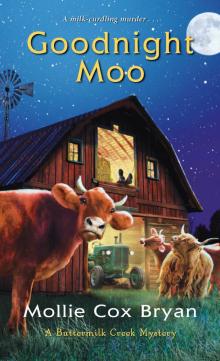 Goodnight Moo
Goodnight Moo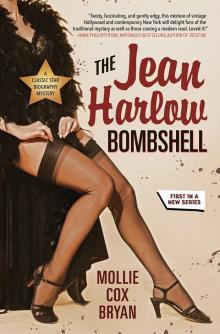 The Jean Harlow Bombshell
The Jean Harlow Bombshell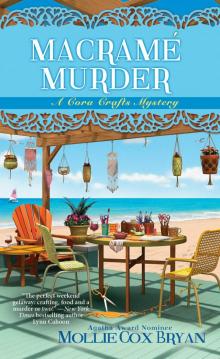 Macramé Murder
Macramé Murder A Crafty Christmas
A Crafty Christmas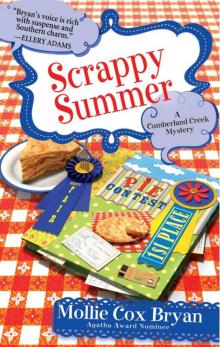 Scrappy Summer
Scrappy Summer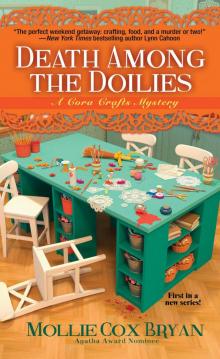 Death Among the Doilies
Death Among the Doilies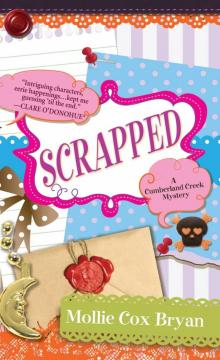 Scrapped
Scrapped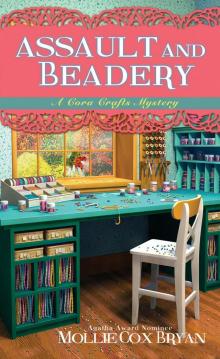 Assault and Beadery
Assault and Beadery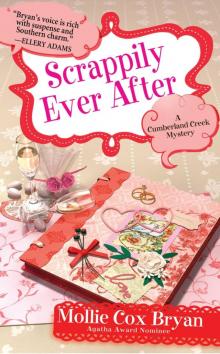 Scrappily Ever After
Scrappily Ever After Scrapbook of Secrets
Scrapbook of Secrets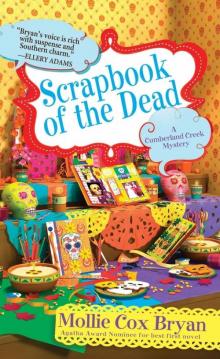 Scrapbook of the Dead
Scrapbook of the Dead